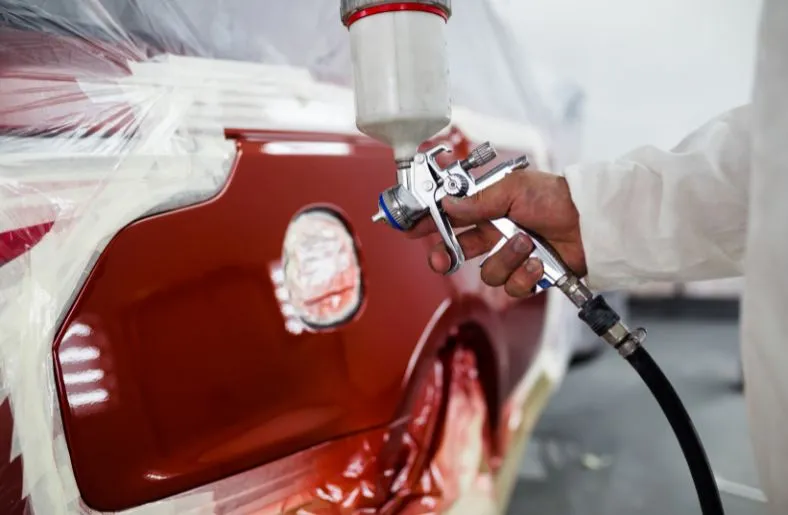Your car’s paint job is not just about aesthetics; it’s also a protective shield that keeps your vehicle’s body safe from the elements and environmental contaminants. Given its importance, it’s natural to be concerned about potential threats to your car’s paint, one of which is grease. Grease is a common substance found in automotive maintenance and repair, but does it pose a risk to your car’s pristine finish?
In this blog post, we will delve into the world of automotive grease, Will grease damage car paint? and debunking some common myths along the way.
Table of Contents
What is Grease?
Grease is a semi-solid lubricant that consists of a base oil, thickening agents, and additives. It is used to lubricate various automotive components, including bearings, joints, and moving parts, to reduce friction and wear.
Grease comes in different formulations to suit specific applications, such as lithium-based, calcium-based, and synthetic grease.
Will Grease Damage Car Paint?
Myth #1: Grease Causes Paint to Fade
One common misconception is that grease can cause car paint to fade. This belief likely stems from the association of grease with industrial and mechanical environments where paint surfaces often endure harsh conditions. However, in typical automotive maintenance scenarios, grease is unlikely to lead to paint fading. Here’s why:
- Chemical Composition: Automotive paint is designed to withstand exposure to a range of chemicals and substances. Grease, in its various forms, does not contain components known to induce fading in automotive paint.
- Surface Contamination: If grease comes into contact with your car’s paint, it is more likely to cause surface contamination than fading. Grease can leave unsightly marks and streaks on your paint, but these can usually be removed with proper cleaning.
Myth #2: Grease Can Cause Paint Discoloration
Another concern is that grease may cause paint discoloration, leading to unsightly blemishes on your car’s surface. While it’s true that certain substances can react with automotive paint and cause discoloration, automotive grease, when used correctly, is not one of them. Here’s why:
- Chemically Inert: Automotive grease, especially the types commonly used in maintenance and repair, is chemically inert. This means it does not react with automotive paint to cause discoloration or changes in pigmentation.
- Isolation: When applied correctly, grease is typically used in areas that are not in direct contact with the car’s painted surfaces. It’s used to lubricate mechanical components, such as bearings or joints, which are separate from the painted body panels.
Myth #3: Grease Can Promote Rust
Rust is a common enemy of car owners, and some worry that grease may exacerbate the problem rather than prevent it. However, this is a misconception that needs clarification:
- Rust Prevention: In reality, automotive grease is often used to prevent rust on metal components. When applied to exposed metal surfaces, grease creates a protective barrier that repels moisture and inhibits rust formation.
- Proper Application: Grease should be applied sparingly and precisely to the metal parts that require lubrication. When used correctly, it serves as an effective rust deterrent without posing a risk to your car’s paint.
Related Guide: How to Lubricate Treadmill Rollers: A Step-by-Step Guide to Keep Your Treadmill Running Smoothly (2023-2024)
Mitigating the Risk of Grease on Car Paint
While grease itself is unlikely to cause significant damage to your car’s paint, it’s essential to take precautions to prevent accidental contact and contamination:
- Cover and Protect: When performing maintenance tasks that involve grease, use protective covers or barriers to shield the car’s painted surfaces from accidental splatter or contact.
- Clean Promptly: If grease does come into contact with your car’s paint, clean it promptly using a gentle automotive-approved cleaner. Avoid abrasive materials or harsh chemicals that may damage the paint.
- Regular Car Wash: Maintain a regular car washing schedule to remove contaminants, including grease, from your car’s surface. This will help preserve the integrity of your paint.
- Professional Care: For more extensive maintenance or repair work that involves grease, consider seeking professional assistance. Experienced technicians can minimize the risk of grease contamination.
Conclusion
“Will Grease Damage Car Paint? “While grease is a common substance used in automotive maintenance and repair, it is not a direct threat to your car’s paint. The myths surrounding grease causing paint fading, discoloration, or rust promotion are largely unfounded when grease is applied correctly and kept away from painted surfaces. As a responsible car owner, your focus should be on taking preventive measures to avoid accidental contact between grease and your car’s paint. Regular cleaning and maintenance, along with proper protection during automotive work, will help keep your car’s paint in excellent condition for years to come.

